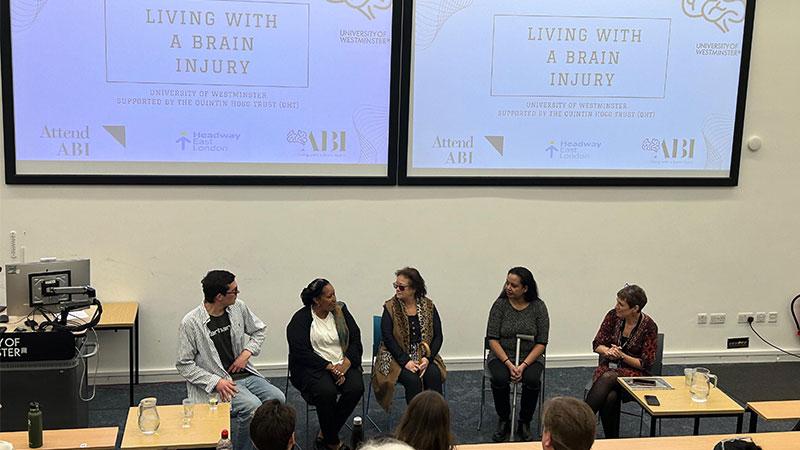In a public event to mark Brain Awareness Week, the University of Westminster invited a panel of brain injury survivors to share their experiences on how their brain injury has changed their lives.

Supported by the Quintin Hogg Trust, the Schools of Social Sciences, Life Sciences and Arts, along with the Brain Matter(s) Student Society joined forces with charities ATTEND and Headway East London to bring together the event titled What It’s Like to Live with a Brain Injury: In Conversation with Brain Injury Survivors.
The conversation explored the survivors’ life stories and how their brain injury has changed their lives and their cognition.
The event opened with a presentation by four of seven student interns studying across Psychology, Computer Science and Media, who are taking part in the Living with a Brain Injury project. They provided an overview of the Quintin Hogg Trust funded project, where Acquired Brain Injury (ABI) survivors, charities, academics and students are working together to bring the lived experience into the classroom and co-create new publicly available teaching resources for authentic assessments.
This was followed by a one-hour panel discussion led by Dr Laura Boubert, Principal Lecturer in the School of Social Sciences and project lead, where five Acquired Brain Injury survivors from ATTEND and Headway East London talked about their injury, how they acquired it and how it has affected their cognitive processes, their emotions and their everyday lives. They gave honest and moving details about their lives and explained what they would like people and employers to know so they can be better supported to live full lives.
The innovation in this project is that while students learn about the Psychology and the Physiology of brain injury, their knowledge is furthered by bringing people with lived experience to the classroom so that their perspectives can be heard. Students are being educated about a common clinical condition which can affect them and their loved ones as well as potential work colleagues, clients and the general public.
The event also marked the official launch of the co-created podcast series Living with a Brain Injury, where listeners can hear in-depth one-on-one conversations with brain injury survivors. This will be launched on Spotify in April.
The event was attended by colleagues, students, external charities and brain injury survivors. President and Vice-Chancellor Professor Peter Bonfield, Dr Thomas Moore, Interim Head of the College of Liberal Arts and Sciences, Alan Porter, Head of the School of Social Sciences, and Natalie Clapshaw, Director of Development at Headway East London, were amongst the attendees.
This was the closing event for Westminster’s Brain Awareness Week calendar, which included a practical workshop on staining brain tissue led by Dr Joan Liu, Senior Lecturer in Cellular Pathology, a Transcranial Magnetic Stimulation Workshop with Dr Karen Bunday, Motor Neuroscientist and Senior Lecturer in Psychology, a Brain and Clay workshop led by Dr Joan Liu and Dr Phoebe Cummings, Research Associate in Westminster School of Arts, which was funded by the Quintin Hogg Foundation. There also was a stimulating and engaging brain research symposium organised by Sara Chaudhury, President of Brain Matter(s) Society. This featured talks from a range of Westminster colleagues including Professor Catherine Loveday, Dr Ilias Kazanis, Dr Nicholas Baidoo, Dr Joan Liu and Dr Laura Boubert. They were also joined by Paul Rotelli, a student from the University of Nicosia, Cyprus. The opening and closing remarks were given by Dr Thomas Moore and Professor Miriam Dwek.
Dr Laura Boubert said: “ABI affects around 1.3 million people in the UK, people of all ages and all walks of life – it can happen to anyone, anytime and change your life forever, yet most people know very little about it. As it’s an invisible condition, it’s crucial that we all know more about it to reduce misunderstanding of the condition to help survivors have a better quality of life.”
Alice McHale, project intern and third-year Cognitive and Clinical Neuroscience BSc Honours student who presented at the event, added: “The raw honesty of those speaking on the panel was both emotional and eye-opening. Throughout this project I have learnt a great deal about brain injury and its potential impact on the lives of those who have experienced it. I feel very grateful to have been involved in working on this project and hope to continue to raise awareness about brain injury moving forward.”
Jennifer, a brain injury survivor who attended the event added: “I found today’s event really informative. I felt comfortable in knowing that I’m not the only one to have to use certain ways to try to live a normal life after my brain injury, it was a very good session.”
This event directly contributes to the United Nations Sustainable Development Goals (SDG) 3: Good Health and Wellbeing, 4: Quality Education and 10: Reduced Inequalities. Since 2019, the University of Westminster has used the SDGs holistically to frame strategic decisions to help students and colleagues fulfil their potential and contribute to a more sustainable, equitable and healthier society. Through a greater awareness people can understand the reality of living with a brain injury, which will help create a more understanding and supportive world.
Find out more about the Centre for Psychological Studies at the University of Westminster.






